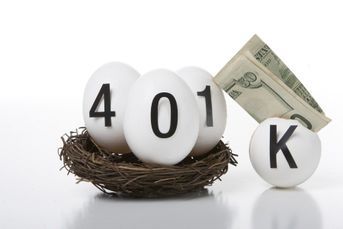Stocks have worst week since 2012 as investors fret over valuations
Major stock market indexes wrapped up their worst week since 2012 with more losses on Friday as investor concern over too-high stock prices sent them to the exits. With the S&P 500 erasing its gains for the year and earnings season just starting, is the long-awaited correction at hand?
The Standard & Poor’s 500 Index and Nasdaq Composite Index capped their worst week since 2012, with stocks most beloved by hedge funds plunging amid concern valuations have climbed too high as earnings season starts.
Allegion Plc, the S&P 500 (SPX) company with the highest hedge fund ownership, had its biggest drop ever for the week. JPMorgan Chase & Co. plunged 7.5%, the most since May 2012, as profit fell. Bed Bath & Beyond Inc. tumbled 8% after the retail chain’s earnings forecast trailed estimates. The Nasdaq Biotechnology Index sank a seventh week, the longest streak since 1998 as the gauge entered a bear market.
The S&P 500 fell 2.6% to 1,815.69 for the week, as the benchmark index erased its gains for the year. The Nasdaq Composite (CCMP) sank 3.1% to 3,999.73 and the Russell 2000 Index slid 3.6% to 1,111.44. All three measures had the biggest retreat since June 2012. The Dow Jones Industrial Average lost 385.96 points, or 2.4%, to 16,026.75, its lowest level since February.
(Don’t miss: Advisers say clients are calm, cool as market crumbles)
“We haven’t had this in so long that people kind of forget,” John Canally, an economic strategist at LPL Financial Corp., said. His firm oversees about $438.4 billion. “It’s painful while you’re in it, but when you’re coming out of it it’s a buying opportunity. If things were different, if credit spreads were widening out, if the Fed was hiking rates, if there were signs of high inflation, it’d be a different scenario.”
Companies in which hedge funds own the most shares have fallen about twice as fast as the overall market since April 2, when the S&P 500 reached a record high of 1,890.90, according to data compiled by Bloomberg.
HEDGE FUNDS
Hedge funds own 30% of the shares in Allegion, Dollar General Corp. and Constellation Brands Inc., the most among companies in the S&P 500. The 10 S&P 500 stocks that are most popular among the speculators have fallen 7.5% since April 2, compared with a 4% drop for the U.S. equity gauge.
About 37% of Allegion, the maker of security systems, is owned by hedge funds. Shares of the company slumped 6.9% in the week to $50.01. H&R Block Inc., the tax software provider that is about 27% owned by hedge funds, is down 6.3%.
Pressure may be mounting on professional speculators with losses in individual stocks spurring more pain than they do for ordinary investors. The average hedge fund has 63% of its assets invested in its 10 largest holdings, twice as much as mutual funds, according to a Goldman Sachs Group Inc. note from Feb. 20. About 28% of their holdings changed in the fourth quarter, an all-time low, the note said.
SELLING SIGN
The percentage of hedge-fund holdings that amount to bets that stocks will rise has decreased to 46%, falling from 58% earlier in the year, a sign of selling, according to an April 9 research note from Credit Suisse Group. Net exposure in the U.S. declined to the lowest level since August 2012, the report said.
“Hedge funds have been forced to reduce their long positions,” Andrew Brenner, the head of international fixed income for National Alliance Capital Markets. “The snowball rolls down and down the mountain and it picks up speed and gets bigger and bigger until it collapses at a selling-type climax. I don’t think it’s happened quite yet. Hedge funds have momentum positions going against them and they have to reduce and reduce until they get stopped out.”
Benchmark indexes started the week with a continuation of a technology selloff that began April 3. Stocks rebounded over the next two days as the Federal Reserve eased concern about the timing of interest-rate increases, only to sink through the rest of the week amid signs of weaker earnings.
BEAR MARKET
The Nasdaq Biotechnology Index dropped 4.5% for the week. The gauge is down more than 20% from an all-time high on Feb. 25, meeting the common definition of a bear market. Portola Pharmaceuticals Inc. fell 18%, the most ever, to $20.78.
The Dow Jones Internet Composite Index dropped 3.3% for a fifth week of declines, the worst stretch since June 2011. Groupon Inc. dropped 11% to $6.95, a 10-month low. Shares of the Chicago-based shopping website operator more than doubled in 2013.
TripAdvisor Inc., which soared 98% last year, lost 7.8% to $78.99. Twitter Inc. retreated 7.2% to $40.05.
Health care and financial shares had the largest drops among 10 major industries in the S&P 500, erasing 4%. The Dow Jones Transportation Average had its worst week since August, falling 2.8%. The Morgan Stanley Cyclical Index slipped 3.3%. An S&P index of homebuilders tumbled 4%. Utilities had the only gain, rising 0.5% as a group.
The Chicago Board Options Exchange Volatility Index surged 22% to 17.03. The gauge has soared 30% since April 2. The Credit Suisse Fear Barometer, which measures investor sentiment based on three-month horizons, closed the week at 31.75, the seventh week the index has been above 30.
Alcoa Inc. (AA) unofficially started the earnings season on April 8 with profit that beat forecasts. The shares ended the week down 0.7% to $12.54.
JPMorgan plunged 7.5% to $55.30 after reporting first-quarter profit that fell short of analysts’ estimates on lower revenue from fixed-income trading and mortgages.
Bed Bath & Beyond lost 8% to $63.72. The U.S. retail industry is suffering from still-shaky consumer spending and diminished traffic at shopping centers. Growth of Bed Bath & Beyond’s same-store sales slowed to 2.4% in fiscal 2013, from 2.7% the prior year.
Profit for members of the S&P 500 probably fell 0.9% in the first quarter, analysts now forecast, after anticipating a 6.6% rise in January. Sales increased 2.6%, according to projections.
About 54 companies in the S&P 500 are scheduled to report results in the coming week, including Coca-Cola Co., Goldman Sachs Group Inc., Yahoo! Inc., Google Inc. and General Electric Co.
“Just watching the market this week, it’s been incredibly volatile,” said James Liu, a Chicago-based global market strategist at J.P. Morgan Funds, which oversees about $400 billion. “The market was looking for growth everywhere they could find it. Now it’s a complete reversal of that.”
(Bloomberg News)
Learn more about reprints and licensing for this article.








